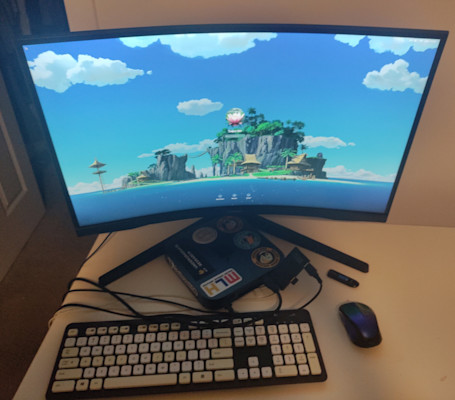Caijun Qin, 22

Caijun Qin is all about finding solutions through technology. Since he discovered coding and computer science, he has challenged himself to create and innovate.
He took his first computer science class, Computer Science Principles, in his senior year of high school. From that point on, he immersed himself in the world of programming. The course was based on a prepared curriculum from code.org, and he immediately became deeply immersed in its project-based learning using JavaScript. Wanting to learn more, he took it a step beyond what the course required. He says, “I implemented features beyond the rubric requirements just to explore the programming language further.” This habit of going above and beyond expectations would drive his success.
Caijun was born in Shandong, China. However, most of his tech growth happened in the United States. As a freshman at Florida State University, he jumped into a Computer Science major, learning programs like C++. His CS education took off with a successful start at FSU—he had a 4.0 GPA and was part of the University Honors program. Still, he was missing something. He felt fulfilled when he worked closely with colleagues, but he recalls, “as I coded more and more, I realized that focusing on real-life inspired projects was more in line with my style.”
Pursuing greater opportunities, he transferred to the University of Florida. Once again, he thought the program should be focusing more on essential industry tools of software engineering. In his junior year, he found the solution that brought it all together: hackathons. His first hackathon, SwampHacks VII, opened his eyes to the potential of the hacker community. UFL orchestrated many of his early hackathons, connecting him to peers with common interests. Before, much of his CS education had been individual, as he explored what he could accomplish alone. Through hackathons, he began to see hacking as a team effort. He says, “I realized team culture was the most important aspect of how successful the end product was […] the hacker community also taught me how important maintaining connections with hard-working hackers is.”
Attending more than 50 hackathons in his university career, Caijun gained practical knowledge. He became adept at using tools like Docker, CircleCI, Google Cloud, and various GitHub features. At RUHacks 2021, he used his growing knowledge and skill set to create PowerSearch, a project that refines search data into practical information his fellow students can use. It won Best Use of DataStax Astra. As his interest in machine learning and data science grew, he learned to use other tools like Streamlit and Scikit-Learn in his hackathon experiences.
MLH has contributed to Caijun’s growth as a coder not only by supporting his hackathon experiences, but by bringing together a community of hackers—he credits Discord servers like the MLH Discord with getting him active in the coding community. Beyond showing him teamwork and collaboration, hackathons have catapulted him to leadership positions in the hacker community. Inspired to spearhead new projects, he has taken several technical officer roles in student organizations on campus. He was a Project Lead for Open Source Club, mentoring newer CS majors in Python application development and GitHub tools. He was also part of the core officer team of his school’s Google Developer Student Clubs chapter, creating teams for the Google Solutions Challenge.
Caijun has a knack for finding innovative solutions to difficult problems. His hackathon experience, campus leadership, and appreciation for the hacker community contribute to his ongoing success.
Quick Facts
Links

Caijun Qin, 22

Caijun Qin is all about finding solutions through technology. Since he discovered coding and computer science, he has challenged himself to create and innovate.
He took his first computer science class, Computer Science Principles, in his senior year of high school. From that point on, he immersed himself in the world of programming. The course was based on a prepared curriculum from code.org, and he immediately became deeply immersed in its project-based learning using JavaScript. Wanting to learn more, he took it a step beyond what the course required. He says, “I implemented features beyond the rubric requirements just to explore the programming language further.” This habit of going above and beyond expectations would drive his success.
Caijun was born in Shandong, China. However, most of his tech growth happened in the United States. As a freshman at Florida State University, he jumped into a Computer Science major, learning programs like C++. His CS education took off with a successful start at FSU—he had a 4.0 GPA and was part of the University Honors program. Still, he was missing something. He felt fulfilled when he worked closely with colleagues, but he recalls, “as I coded more and more, I realized that focusing on real-life inspired projects was more in line with my style.”
Pursuing greater opportunities, he transferred to the University of Florida. Once again, he thought the program should be focusing more on essential industry tools of software engineering. In his junior year, he found the solution that brought it all together: hackathons. His first hackathon, SwampHacks VII, opened his eyes to the potential of the hacker community. UFL orchestrated many of his early hackathons, connecting him to peers with common interests. Before, much of his CS education had been individual, as he explored what he could accomplish alone. Through hackathons, he began to see hacking as a team effort. He says, “I realized team culture was the most important aspect of how successful the end product was […] the hacker community also taught me how important maintaining connections with hard-working hackers is.”
Attending more than 50 hackathons in his university career, Caijun gained practical knowledge. He became adept at using tools like Docker, CircleCI, Google Cloud, and various GitHub features. At RUHacks 2021, he used his growing knowledge and skill set to create PowerSearch, a project that refines search data into practical information his fellow students can use. It won Best Use of DataStax Astra. As his interest in machine learning and data science grew, he learned to use other tools like Streamlit and Scikit-Learn in his hackathon experiences.
MLH has contributed to Caijun’s growth as a coder not only by supporting his hackathon experiences, but by bringing together a community of hackers—he credits Discord servers like the MLH Discord with getting him active in the coding community. Beyond showing him teamwork and collaboration, hackathons have catapulted him to leadership positions in the hacker community. Inspired to spearhead new projects, he has taken several technical officer roles in student organizations on campus. He was a Project Lead for Open Source Club, mentoring newer CS majors in Python application development and GitHub tools. He was also part of the core officer team of his school’s Google Developer Student Clubs chapter, creating teams for the Google Solutions Challenge.
Caijun has a knack for finding innovative solutions to difficult problems. His hackathon experience, campus leadership, and appreciation for the hacker community contribute to his ongoing success.
Quick Facts
Links




